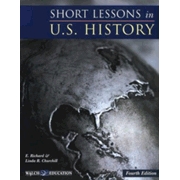Please read my review of Short Lessons in World History since this book is by the same authors and is similar in format. I'll focus on points where Short Lessons in U.S. History differs from Short Lessons in World History.
At 222 pages, this book is slightly lengthier than World History. Since it is covering a much briefer span of time, it actually provides coverage that might be considered comprehensive enough to serve as a stand-alone text for a high school course. However, since that course would not be as challenging as most high school courses, I think it serves best as a text for grades 7 and 8 or for struggling high school students.
Alternatively, Short Lessons in U.S. History might also be used as a spine book for a real books approach. The timeline information at the beginning of each unit adds another column of "Events Elsewhere," listing concurrent world history events.
The book is divided into 11 units and there appear to be from 4 to 6 of the "Activating Prior Knowledge" questions at the beginning of each unit--a few more than in World History. But perhaps that compensates for fewer units.
Short Lessons in U.S. History exhibits a liberal bias that was not apparent in World History, although it is not extreme. For instance, the individuals highlighted with positive coverage in boxes in units 7 through 11 are Eddie Rickenbacker, Louis Armstrong, Amelia Earhart, Jesse owens, Ralph Bunche, Irene Morgan (forerunner to Rosa Parks), Shirley Chisholm, Cesar Chavez, Jesse Jackson, Sandra Day O'Connor, Amy Tan, Bill Gates, Colin Powell, and Condoleezza Rice. Government intervention such as the New Deal, welfare, and other such programs are spoken of positively. The New Deal is credited with "getting the nation back on its feet" (p. 148).
The following question, raised along with a list of other questions on the last page, best illustrates the political perspective: "Government needs money to do things for its citizens. Some countries have a Value Added Tax or VAT on goods. Rather than an increase in the income tax rate, many people would like to see a national sales tax or VAT. What are some other ways for the government to raise money?" Such a question assumes that the government should be trying to expand both its services and its spending, a position with which many might take issue. Students are led to an attitude supportive of expanded, socialistic government programs.
In spite of these examples, the bias is no more extreme than most texts used in government schools, and likely less so than some. And given that this is a briefer text than others, there should be plenty of time to have students read other sources that provide broader or alternative viewpoints.
Compared with other resources available to homeschoolers, I think Short Lessons in U.S. History is likely to be a popular choice for junior high students and even for some in high school, especially for those having difficulty finding a text that is not overtly Protestant and/or politically conservative.











